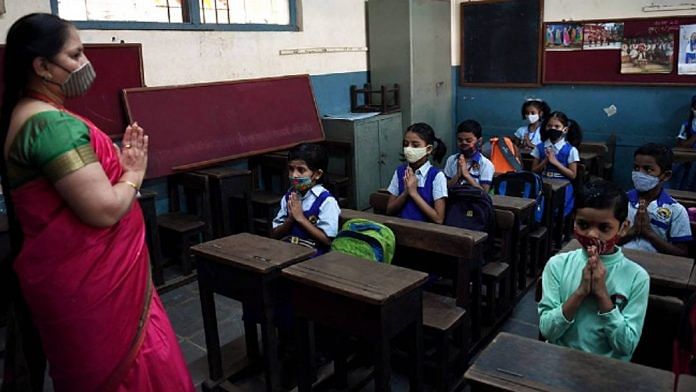New Delhi: The new draft National Curriculum Framework (NCF) for School Education has suggested that schools “may choose” not to provide chairs for teachers in classrooms “so that they must remain standing and in moving condition”.
Released by the education ministry last week, the draft guidelines state that the arrangement of furniture in classrooms communicates a school’s “beliefs on teaching-learning processes”.
According to a section of the draft NCF called ‘Symbols’, schools communicate what they value through symbols — “any form of visual sign, writings on wall, paintings, idols, arrangement of physical objects” in classrooms.
It further mentions that the “choices of physical objects” also carry a lot of symbolic value, adding that a principal’s chair “would look very different than chairs for staff”.
The draft rules emphasise that schools should consciously decide how to “effectively use the power of symbols” in alignment with their principles so that students feel welcome to share their ideas and learn in an inclusive environment.
In a similar vein, the draft suggests a seating arrangement where children sit in circular groups for greater engagement.
In 2019, the Women’s Commission had reprimanded a prominent school in Kerala’s Thiruvananthapuram for “not allowing teachers to sit for eight hours straight” through the school day, according to a report in The New Indian Express.
What is the NCF?
The NCF is being developed as part of the National Education Policy (NEP) 2020, which proposes extensive changes to the educational system. The initiative is being led by the National Council for Educational Research and Training (NCERT), an organisation that develops curricula for K-12 (kindergarten to 12th grade) students.
On 6 April, the education ministry disseminated the draft NCF for secondary education and solicited feedback from various stakeholders. The ministry stated that due to the wide variety of student requirements, instructional strategies, and course content across K-12, feedback was essential.
The draft NCF for Early Childhood Care and Education has already been launched, while work on the NCF for Teacher Education and NCF for Adult Education has been initiated.
The NCF, once adopted by the CBSE and other state boards, would reorganise not only textbooks but also the selection of topics, the organisation of lessons, and the methods by which students are evaluated.
The NCF was last updated in 2005 under the Congress-led UPA government. All of the current NCERT textbooks are, with a few exceptions, derived from the NCF 2005.
The NCF was updated thrice prior to 2005, in 1975, 1988 and 2000.
(Edited by Nida Fatima Siddiqui)



